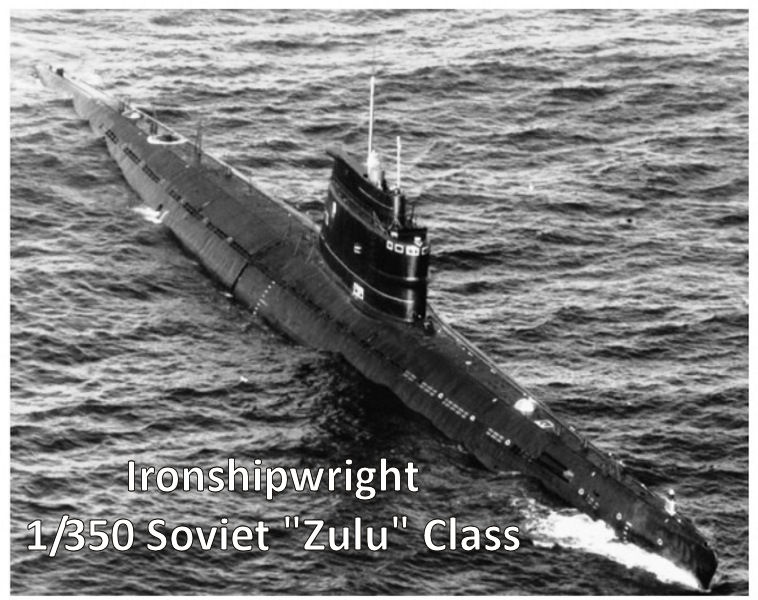Iron Shipwrights
1/350 Scale Soviet Submarine
Project 611 NATO
Reporting Name: Zulu class

Iron Shipwrights
1/350 Scale Soviet Submarine
Project 611 NATO
Reporting Name: Zulu class

| Reviewed
December 2024
by Felix Bustelo |
|||||||||
| HISTORY | |||||||||
|
The
design of the postwar Project
611/Zulu
class submarine is believed to have begun in 1944 incorporating wartime
experiences and the advancements in technology found in the German Type
XXI U-boat. They were long-range submarines with a 60-day endurance. They
were intended for reconnaissance missions, attacking Atlantic shipping
routes and attacking U.S. ports with nuclear torpedoes.
From
1952 to 1957, 36 Zulu
class submarines proposed but only 21 were actually completed as attack
submarines. The boats measured 295 feet 2 inches overall (90 meters), with
a beam of 24 feet 7 inches (7.5 meters) and a draft of 10 feet 8 inches
(6 meters). The Zulu
class displaced 1,900 tons surfaced and 2,350 tons submerged. They had
diesel-electric propulsion with a maximum speed of 18 knots surfaced and
16 knots submerged. Torpedo armament consisted of ten 21-inch (533mm) tubes,
with six forward and four aft. The early ZuluI and Zulu
II
boats had guns fitted on the sail and a deck gun (Zulu
II).
All guns were removed in the Zulu
III
and Zulu
IV
variants. A ballistic missile version with an enlarged sail containing
a pair of launch tubes was developed and designated a Zulu
V.
A total of five of that version were completed.
ISW is a Zulu IV variant. |
|||||||||
| Iron Shipwrights Project 611/Zulu class submarine | |||||||||
|
The Zulu
class kit is the latest in a series of modern submarine kits released in
the past several months by Iron Shipwrights and a departure in that it
is their first Soviet naval subject. The kit represents a Zulu
IV
variant. Like the other kits in this line, Zulu
is comprised of a cast resin hull from a 3D printed master pattern. All
of the other parts are 3D printed. The contents come in a sturdy flip-top
box, with the resin hull wrapped in bubble wrap and the 3D printed parts
inside a zip-lock sleeve. Everything is cushioned in Styrofoam packing
nuggets. The assembly instructions are folded on top of the box contents.
|
|||||||||
|
|
|
||||||||
| HULL | |||||||||
|
The
cast resin full hull is very nicely done and is packed free of a casting
block. The hull is well detailed with limber holes, hatches, and the emergency
rescue buoys that are common on Soviet and Russian submarines. The hull
also has a recess for the anchor and openings to fit the diving planes,
stabilizers, rudder and sail. The casting is overall clean and crisp but
requiring some cleanup along the keel where remnants casting plugs were
once located and some extra resin. The hull measures a little more than
10 inches long, which is spot on in terms of scale.
|
|||||||||
| 3D Printed Parts | |||||||||
|
The
3D parts come of a printing raft and includes the sail, forward and aft
diving planes, anchor, rudder, stabilizer and propellers. To equip the
sail, the raft also provides the radar, quad loop radio direction finder,
antennas and scope. The parts have thin attachment points and some of the
parts have extras provided in case of breakage. The parts appear to be
well detailed. Based on my experience building some other Iron Shipwrights
submarine kits, the 3D printed parts are a tad brittle and care must be
exercised removing the smaller parts, such as the propeller, from the raft.
|
|||||||||
| Decals and Photoetch | |||||||||
|
No
decals or photo-etch are provided with this kit. The latter isnít necessary
with the 3D printed parts but specific markings for hull and red/white
pattern for the rescue buoys must be sourced from another decal sheet.
|
|||||||||
| INSTRUCTIONS | |||||||||
|
The
assembly instructions come on 4 single-sided stapled pages. The first page
has the Iron Shipwrights logo on top, with a small photo of Zulu IV submarine
and the usual text about obtaining replacement parts and general instructions
and advisories. Page 2 has images of the 3D printed parts with corresponding
part numbers and some general guidance working with 3D printed parts. Pages
3 and the top of Page 4 have assembly diagrams which are very clear and
simple due to the low part count. The bottom image on Page 4 has on overall
image of the completed model. No painting instructions are provided, so
some research on the part of the modeler will be needed.
|
|||||||||
|
|
|||||||||
| Conclusions | |||||||||
|
This
is complete kit and overall well-done kit that should build into a detailed
model of a Zulu
IV
submarine. I recommend this kit for submarine enthusiasts or fans of Cold
War Soviet subjects. The kit sells for $64.95 and is currently the only
kit of a Zulu IV class kit that is available. This kit is available directly
from Iron Shipwrights (http://ironshipwrights.com/)
or one of the retailers that sell their products.
My thanks for Iron Shipwrights for providing the review
sample. |
|||||||||
